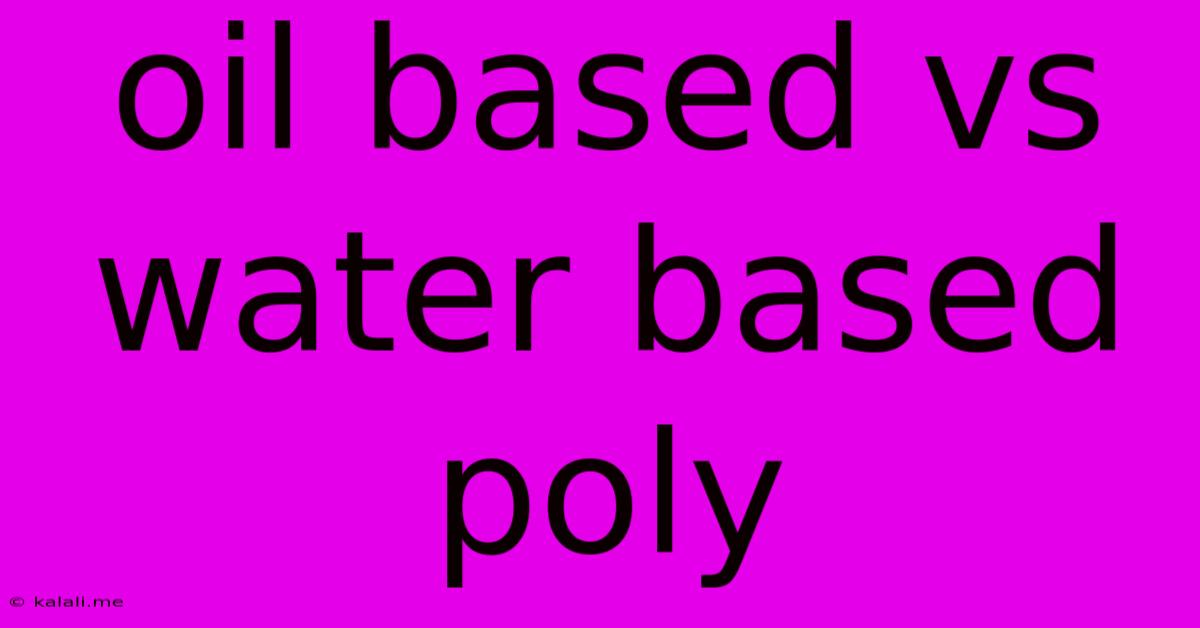Oil Based Vs Water Based Poly
Kalali
May 26, 2025 · 3 min read

Table of Contents
Oil-Based vs. Water-Based Polyurethane: Which is Right for Your Project?
Choosing between oil-based and water-based polyurethane can feel overwhelming. Both offer durable finishes, but their application, drying times, and overall characteristics differ significantly. This guide breaks down the key differences to help you select the best polyurethane for your specific needs, whether you're refinishing furniture, protecting a wooden deck, or adding a sealant to your floors.
Understanding the Key Differences:
The core distinction lies in the solvent used: oil-based polyurethanes use mineral spirits or solvents, while water-based options utilize water. This fundamental difference impacts several aspects of the finish:
Drying Time:
-
Oil-Based: Known for its slower drying time, often requiring several hours between coats and a full day or more for complete curing. This extended drying time allows for better leveling and fewer brush strokes, resulting in a smoother finish. However, it significantly increases project completion time.
-
Water-Based: Dries much faster, typically within a few hours, allowing for quicker project turnaround. Multiple coats can often be applied in a single day. This speed is a major advantage for busy DIYers or professionals with tight deadlines.
Clean-up:
-
Oil-Based: Requires mineral spirits or paint thinner for cleanup, adding an extra step and requiring careful disposal of solvents. This also means more ventilation and safety precautions are required.
-
Water-Based: Easily cleaned up with soap and water, making it a more convenient and environmentally friendly option. This simplifies the process and reduces the risk of harmful chemical exposure.
Durability and Yellowing:
-
Oil-Based: Generally considered more durable and resistant to scratches and wear, making it a good choice for high-traffic areas or furniture that experiences regular use. However, it tends to yellow over time, especially when exposed to UV light.
-
Water-Based: While offering excellent protection, it might be slightly less durable than oil-based polyurethane in high-impact situations. However, modern water-based formulations are catching up rapidly, offering impressive durability and resistance. Furthermore, water-based poly tends to retain a clearer finish, resisting yellowing better than oil-based alternatives.
Odor and VOCs:
-
Oil-Based: Possesses a strong, pungent odor during application and drying. It also contains higher levels of volatile organic compounds (VOCs), contributing to air pollution.
-
Water-Based: Has a much milder odor, making it a better choice for indoor projects or individuals sensitive to strong smells. Low-VOC or zero-VOC formulations are readily available, making it a more environmentally conscious option.
Application:
-
Oil-Based: Often requires more skill to apply evenly due to its slower drying time. Brush strokes can be more visible if not applied carefully.
-
Water-Based: Easier to apply and blend due to its quicker drying time, making it more forgiving for beginners. It also tends to produce a smoother finish with less visible brush marks.
Surface Preparation:
Proper surface preparation is crucial for both types of polyurethane. This involves cleaning, sanding, and ensuring the surface is completely dry before application. This step is universally important regardless of your chosen finish.
Choosing the Right Polyurethane:
The "best" polyurethane depends entirely on your project's specific needs:
-
Choose oil-based polyurethane for: High-traffic areas, projects requiring maximum durability, and situations where yellowing is less of a concern.
-
Choose water-based polyurethane for: Interior projects, faster drying times, easier cleanup, low-odor applications, and environmentally conscious projects.
By carefully considering these factors, you can confidently select the polyurethane that delivers the best results for your project, ensuring a beautiful and long-lasting finish. Remember to always read the manufacturer's instructions for specific application details and safety precautions.
Latest Posts
Latest Posts
-
Bash Sequence U001 Delete Left Cursor
May 26, 2025
-
Tmux Begin Selection Hijk Doesnt Work
May 26, 2025
-
Who Cast The Fidelius Charm On The Seaside Cottage
May 26, 2025
-
How Long Is Yeast Good For
May 26, 2025
-
Some Vents Not Blowing Air In Car
May 26, 2025
Related Post
Thank you for visiting our website which covers about Oil Based Vs Water Based Poly . We hope the information provided has been useful to you. Feel free to contact us if you have any questions or need further assistance. See you next time and don't miss to bookmark.